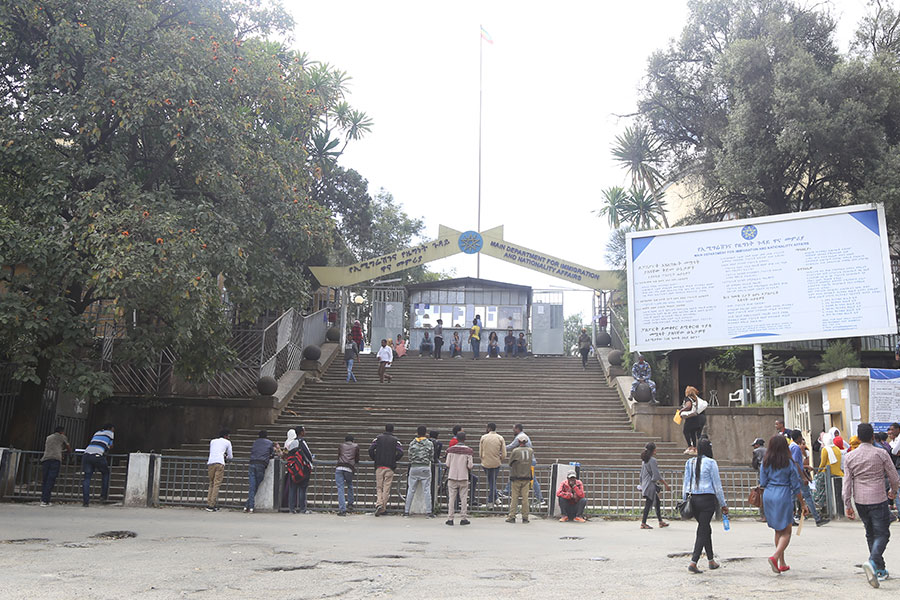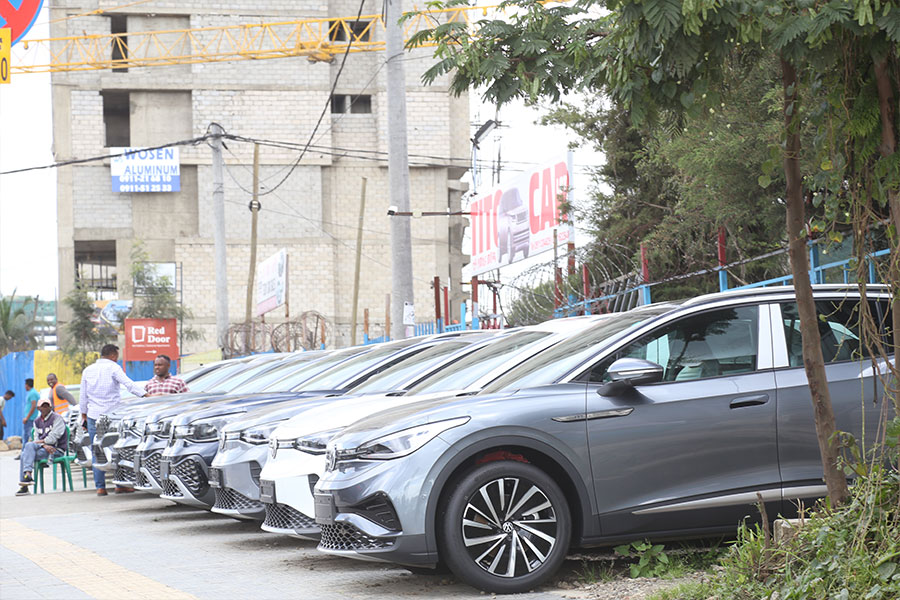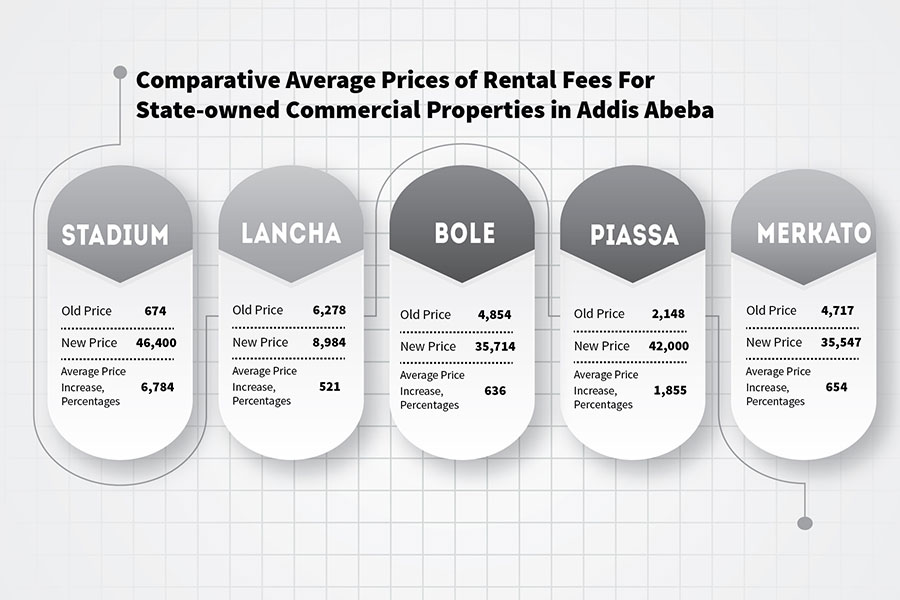
Photo Gallery | Dec 10,2018
On the sunny morning of Thursday, April 23, 2020, an array of people gathered to inquire about the new directive issued by the Ministry of Transport that has limited the use of private cars. They’ve assembled around the iron-rod gate of the Federal Transport Authority near National Stadium on Equatorial Guinea Street.
They heard there are exceptions to the conditions that have been set by the government on using private vehicles in rotation, and they were wondering if they too might fit the bill.
The security guard standing at the gate interrupts their questions and points his finger up to the right of the wall even before they have finished speaking. He points to two small printed notices that have been plastered to the wall overlapping one another.
The first notice announces that only personnel directly involved in activities linked to the Novel Coronavirus (COVID-19) pandemic can be given a special permit to use their private cars on all days throughout the week and that this will only include health professionals at the moment.
The more detailed of the two notices goes on to list three requirements for any health professional expecting to get this permit: a support letter from the office where they work, proof of ownership of the car, and the person's employment identification.
Solomon Abegaz does not fall under these exceptions. The 39 year old bank manager will no longer be able to use his car to go from where he lives in Megenagna to his work past Torhailoch three times a week.
He is taking shifts now with his deputy as either one of them has to be there to authorize documents. Whenever either of them is present, they work round the clock and can not go anywhere or take any breaks.
"We have employees coming from far places as well, as far as Burayu, and it is costing them a lot as they’re reluctant to use public transport for fear of the virus," he said.
Those that are opting to take public transportation are finding it difficult because there’s a big shortage nowadays, according to Solomon.
This directive, which became effective as of April 18 and perhaps the most controversial yet, permits private vehicles to be used only every other day. Cars with an even digit at the end of their license plate may drive on one day and those with an odd digit at the end of their license plate may drive the next.
“We’re quite lucky actually,” said Solomon. “My plate number ends in an even number and my deputy’s ends with an odd one but not everyone’s situation works as well.”
Out of the total 613,638 vehicles in the capital, a third of them or 218,028 have a code-02 or private license plate. But not all code-02 cars will be affected.
Privately-owned code-02 cars with plate numbers ending in an odd number can be driven on Mondays, Wednesdays, Fridays, while Sundays are open for both.
Depending on the nature of their job, any professional directly involved in matters relating to the state of emergency can move around on all days using a special pass issued by the Federal Transport Authority.
"The Authority is responsible for providing these special passes," confirms Abdulber Shemsu, deputy director of the transport sector at the Authority.
Based on the list of institutions that the Ministry of Health deems to be directly involved in COVID-19 activities, the Authority will provide special permits, according to the given criteria.
"We need the Ministry to verify the validity of the institutional claim first," he said. "Though the Authority is only giving permits to health professionals, the exception might expand to include more."
Solomon hopes that banks too might shortly be included.
“We're serving basic needs for the society by making banking accessible to them without travelling far," he said.
Additionally, the Bank has a lot of clients in the pharmaceutical industry that work in supplying sanitisers and health products.
"We're communicating with relevant government bodies to be included,” Solomon said.
The Authority has already issued 1,800 special permits to the Ministry of Health. These permits have been issued temporarily, and the Authority has completed testing of a secure system and will replace the permits on Monday with newly printed ones that will last for the duration of the state of emergency.
"The directive aims to achieve two things," said Abdulber, "One is to protect citizens from the virus by limiting mobility. We believe it's reasonable to allow movement four times a week for an individual with their own private car." The second purpose is to facilitate public transport by minimising the traffic in the city.
The directive has also reduced the number of passengers on all of the city's public buses and taxis to 50pc and the light rail to 25pc capacity. This was done in order to lessen contact between passengers.
Limiting the code-02 cars to driving on certain days is expected to further enhance this effort, according to Abdulber.
With the number of people on public transport halved, the directive aims to facilitate the use of already existing public vehicles in the system.
Less cars circulating in the city means a better flow for public transport and more people can be accommodated within the same time frame. The Authority is also reassigning cross-country buses to be used in the city and procuring new ones to meet the demands of public transport.
The directive states that cross country buses are allowed to travel only from 6:00am until 9:00pm. In addition to this, different shifts have also been set for the bus arrival times so as to minimise crowds at stations.
The rotation is only for privately-owned cars and does not apply to rentals, company cars or government-owned cars. The Authority, given that public and private employees are expected to have transport covered by their institutions, does not expect this scheme to create a major problem.
"In times like these, we must be willing to bear some of the burden," says Abdulber. "We're aware it will affect some individuals, and there will be a few complaints.”
True to the predictions of the Authority, there are a lot of displeased citizens that have been inconvenienced by the new changes.
Birhan Hassen, a 28-year-old co-founder and chief marketing officer of a local import-export company is one such citizen. The business, which exports pulses, oilseeds and spices and imports plastic raw materials and steel car tyres, is in its nascent years and requires him to not only be present at the office but also to make rounds throughout the city almost on a daily basis.
"There's a lot of indispensable work that I have to physically be present to do," he said. "I have to go meet clients and sample items. My line of business requires a lot of paperwork with government bodies, and I rely on my car to get me to places."
His white 1989 Toyota Hilux serves as his transportation and also allows him to haul samples and locally made materials from a location in Ayertena to different parts of the city. Now he has resorted to taking private cabs when he is not allowed to drive.
"The amount I'm spending on two days for a taxi can easily see me through a week with my car," he said. "It's very inefficient and taking public transportation is unthinkable because of the queues."
Private car owners also feel that the new arrangement will expose them to public places while taking public transportation. They argue that it could expose them to the virus.
However, Endalkachew Tsegaye, communication affairs director at the Ministry of Transport, argues that the public transport sector is functioning in line with the health guidelines.
Operators use masks and sanitiser, and public buses are cleaned with chemical spray after every round-trip. This is all done in an effort to make public transport safe.
So far, there have not been any punitive measures taken against private cars within the first week since the rotation scheme became operational.
The Addis Abeba Traffic Commission, with over 1,000 traffic police officers, has yet to receive any specific instructions on the procedural and punitive measures to be taken on trespassers.
"It was the first week, and there're still some issues to sort out, but we're leaning toward educating and giving warnings for now," said Commander Shewayirga Gizaw, director of traffic control at the Addis Abeba Police Commission. "We're, however, strictly overseeing that public transportation guidelines are being followed."
The Commission has so far penalized 268 drivers for not adhering to public transportation laws decreed under the state of emergency, particularly on seating over capacity and overcharging passengers. Out of that group, 195 of the offenders had passengers over the allowed capacity, a breach punishable by up to 5,000 Br and license revocation.
Failure to comply with the laws during the state of emergency will result in imprisonment and fines ranging between 1,000 Br and 200,000 Br. The specific details for non-observance of the car rotation scheme is being worked out by the Transport Authority.
"Upon the request of regional governments and the City Administration," said Abdulber, "we're working on a procedure, and we'll have a response by the end of this week."
This will hardly reach the intended goal as it will create more burden on public transportation, according to an expert in traffic flow and management who commented on the condition of anonymity.
"There're still heavy trucks driving at all hours of the city currently. Arranging specific times for that could have been the first step," he said. "There're no tourists, and most hotels aren't functioning so the traffic flow has already greatly decreased.”
The ban is there to discourage movement, but it must be remembered that lives still need to be led, according to the expert.
For people like Birhan, the law itself seems very unnecessary.
In the past month the streets have been open, unlike any other time. People are staying home, and there is also no school, so traffic has already decreased immensely, according to him.
"It takes a few minutes to get to places that would normally take much longer," he said. "I don't see why it was necessary to add this."
PUBLISHED ON
Apr 25,2020 [ VOL
21 , NO
1043]

Photo Gallery | Dec 10,2018

Fortune News | Dec 10,2022

Fortune News | Jul 01,2023

Featured | Aug 10,2019

Editorial | May 03,2025

Fortune News | Aug 26,2023

Fortune News | Jun 15,2024

View From Arada | Aug 30,2025

Fortune News | Dec 27,2018

Agenda | Dec 10,2018

Dec 22 , 2024 . By TIZITA SHEWAFERAW
Charged with transforming colossal state-owned enterprises into modern and competitiv...

Aug 18 , 2024 . By AKSAH ITALO
Although predictable Yonas Zerihun's job in the ride-hailing service is not immune to...

Jul 28 , 2024 . By TIZITA SHEWAFERAW
Unhabitual, perhaps too many, Samuel Gebreyohannes, 38, used to occasionally enjoy a couple of beers at breakfast. However, he recently swit...

Jul 13 , 2024 . By AKSAH ITALO
Investors who rely on tractors, trucks, and field vehicles for commuting, transporting commodities, and f...

Oct 18 , 2025
The political establishment, notably the ruling party and its top brass, has become p...

Oct 11 , 2025
Ladislas Farago, a roving Associated Press (AP) correspondent, arrived in Ethiopia in...

Oct 4 , 2025
Eyob Tekalegn (PhD) had been in the Governor's chair for only weeks when, on Septembe...

Sep 27 , 2025
Four years into an experiment with “shock therapy” in education, the national moo...